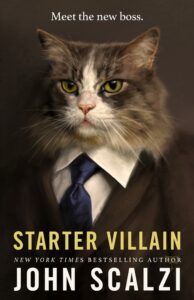
I’d been hearing a lot about the work of John Scalzi for a long time, but I hadn’t actually read any until his pandemic novel, The Kaiju Preservation Society, made the 2023 Hugo shortlist. And with the appearance of Starter Villain on the 2024 Hugo shortlist for the Best Novel category, this is the second consecutive year I’ve visited his work in my Hugo reading.
Starter Villain stars an out-of-work business journalist in the Chicago suburbs, picking up substitute teaching shifts to make ends meet while wistfully dreaming of buying a neighborhood pub. But when he receives word that his estranged Uncle Jake has died and has left him a significant fortune in exchange for completing a seemingly simple task, he finds himself thrust into a secret world of supervillains, complete with sentient animal underlings and a hidden lair inside a volcano.
That’s the description of a novel that doesn’t take itself too seriously, and it mostly lives up to the lighthearted promise. It’s short and easy to read, with a heaping helping of the snark that I understand to be a Scalzi staple. There are a few turns of phrase awkward enough to pull me out of the story entirely, but the storytelling quickly settles back into a comfortable rhythm that keeps the pages turning quickly. As long as you’re on board with the overall premise of a blank slate protagonist getting thrown into an over-the-top world of supervillains, it’s an easy and entertaining read.
But even amidst an unapologetic dive into the world of supervillain tropes, it’s clear that Starter Villain also has a social point to make. Perhaps the only way in which the lead is not a blank slate is his background as a business journalist, which allows him to comfortably process the economics of the entire enterprise, mostly consisting of a handful of wealthy heirs manipulating global events to increase their own fortunes. And while Uncle Jake was not so bad as all that—giving the lead’s inherited business the moral high ground in almost any direct conflict with his peers—even he had aggressively busted a burgeoning union among his animal employees, a fact which Starter Villain portrays just as negatively.
The commentary on hoarding wealth, class warfare, and market manipulation doesn’t go especially deep, but it works as far as it goes, and it delivers some truly satisfying moments, including one that serves as the real emotional climax of the novel. But it’s the epitome of a “don’t think too hard about it” novel, and even many of the moments that feel fun during the reading process can get more and more irksome with more reflection.
Part of that is the depth of the theming, which is also the easiest to dismiss. No, the novel doesn’t interrogate the difference between highly controlled breeding of sentient employees and general mistreatment of warehouse workers. But there are gestures in that direction, and keeping that storyline fast-moving and surface-level is in keeping with the tenor of the novel as a whole. But key plot points requiring baffling errors by the lead are harder to swallow, and even some of the most satisfying moments of payoff are later undercut by developments rendering them relatively unimportant. Even if they deliver in the moment, they get less satisfying on further reflection.
On the whole, I had fun reading Starter Villain, which was a pleasant surprise after my dislike of The Kaiju Preservation Society. There were some passages that pulled me out of the story, but overall, it was pretty fun and didn’t make the reader work too hard. Had I not read it as part of an online book club (the Hugo Readalong), I’d have slapped 3.5 stars and never thought about it again. But it’s not well-suited for discussion, because it’s too heavily focused on clicking in the moment and has too many pieces that don’t hold up to reflection. Still not a bad read, but not one to linger over.
Recommended if you like: lighthearted takes on superhero tropes.
Can I use it for Bingo? It’s a Book Club book that Features Criminals, and would certainly be a candidate for Judging a book by Its Cover.
Overall rating: 13 of Tar Vol’s 20. Three stars on Goodreads.
